CATTI-题库-真题-模拟-课程-直播
 Stanford
Stanford
 2024-06-18
2024-06-18

 900次
900次
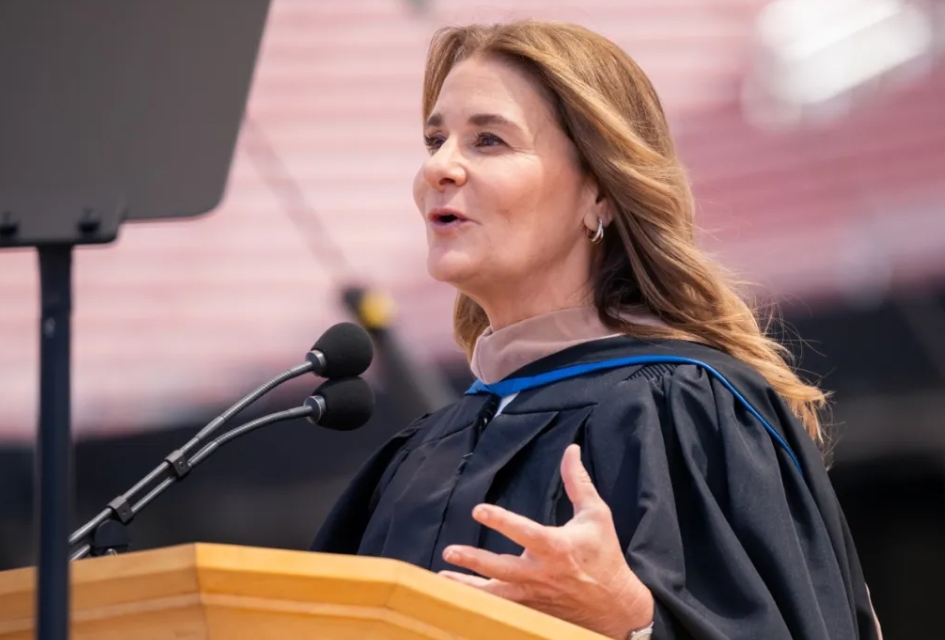
Thank you, President Saller. And Good morning, Class of 2024.
It is such an honor to be here with you and your families on this truly happy occasion.
Today is the day you graduate from Stanford University, and that is an amazing accomplishment.
Stanford has always held a special place in my family’s heart.
My dad, Ray French, received a scholarship to study mechanical engineering here in 1960.
And while he worked on his master’s degree, my mother, Elaine French, supported them with her job at a bottled water company.
On nights and weekends, she was my dad’s lab assistant.
There’s an old photo I love of my mom, pregnant with my sister, standing next to the wind tunnel in the engineering lab with a clipboard and a stopwatch.
Today, my mom and dad are back on campus for a very special occasion: To watch their granddaughter Phoebe graduate from the university that changed my Dad’s life.
And Phoebe’s not the only one to follow in his footsteps.
My older daughter, Jenn, and my son-in-law, Nayel, earned their degrees here, too.
So happy Father’s Day, Dad – and to all the dads here.
And Mom, thanks for making this story possible.
I know there are many, many, many other parents, grandparents, and loved ones who are here and as proud to be here as my family and I are.
Graduates, you’ve given us a lot to celebrate. And also a lot to admire.
You arrived on this campus already accomplished and ambitious young people.
And during your time here, you’ve also proven how adaptable you are and what powerful advocates you are for the causes you believe in.
Stanford is a demanding university.
And your time here was made even more challenging by what was happening in the world all around you.
From a once-in-a-century pandemic that changed the way you lived and learned to multiple wars that I know this campus is feeling very, very deeply.
There is no question you are graduating into a different world than the one you matriculated into.
But you are also leaving this campus prepared to be the leaders that we all need.
And today marks an important milestone in that journey.
Shortly after I sit down, you will be invited to rise if you are able.
You will hear that call as a Stanford student.
You will answer that call as a Stanford graduate.
And with that, a major transition in your life will begin.
I’ve been thinking a lot lately about transitions.
The spiritual leader Ram Dass had a wonderful teaching about two waves traveling through the ocean: one big and one small.
And as the waves get closer to land, the big wave sees what’s about to happen.
They see all the waves ahead of them are just crashing onto the shore.
And devastated, the big wave says to the small wave, he warns them that the end is near.
And the small wave just smiles and says, “Don’t worry, we’ll be fine.”
“You don’t understand,” the big wave insists. “We’re done for.”
And the smaller wave is just totally calm and says: “No, we’re not. And I can explain why in just six words: ‘You’re not a wave. You’re water.’”
I love that story.
It captures what it is like to experience an enormous transition without losing the core of who you are.
I turn 60 this year.
And you don’t get to be my age without navigating all kinds of transitions.
Some you embraced and some you never expected.
Some you hoped for and some you fought as hard as you could.
For me, those included starting my career at Microsoft.
Losing one of my very best friends to cancer.
Falling in love.
Having children.
Starting my work on behalf of women and girls.
And ending a marriage and partnership of almost 30 years.
And, very recently, making a major career shift.
In each case, there was a moment that I felt like that big wave, terrified that life as I knew it was about to be over.
But I always made it to the next day.
And so will you.
And I’ve learned that the next day is when the real work begins.
Because what we do the next day is what makes us who we are.
So, in addition to honoring all your accomplishments today, I also want to offer you something to think about when you wake up tomorrow – three lessons I’ve learned from my own experience with transitions.
The first piece of advice is to enter these moments with radical openheartedness.
Most of the time, we walk around through life in the thicket of our everyday routine.
But during a transition, we step out of our familiar surroundings into a big, wide, open space where everything is new.
And there are two ways to encounter these spaces.
You can keep your head down and focus on finding the shortest distance possible from one familiar thing to the next.
Or you can find the courage to linger in that liminal space and see what it has to tell you.
That, to me, is practicing openheartedness.
I have to admit as a young person, I managed transitions the first way.
I had a list of goals I wanted to accomplish, and as soon as I checked one off the list, I raced across the clearing to the next one.
Because frankly, it was a lot less scary that way.
But as I’ve gotten older, I’ve learned the value of embracing uncertainty.
I’ll give you one example of what this has looked like in my life.
When I entered philanthropy more than 25 years ago, it was completely unfamiliar terrain.
I didn’t have any experience in global health or development yet.
So I had a lot to learn, and I knew I’d need to pay attention.
Initially, we thought the foundation’s work was going to focus on vaccine access.
But when I started traveling around the world to see that work in action, the women I met kept changing the subject.
They’d say, “What about the shots I used to get?” they asked me.
And they were talking about contraceptives.
So I stopped and I listened to what they had to say.
And soon, I was talking about contraceptives on almost all my trips and continuing those conversations back home with my team.
And those conversations led to others.
I learned how much society benefits when women are able to make their own decisions, control their own resources, and direct their own futures.
And I began to focus my efforts there instead.
I think back now to those early trips with such gratitude, because the women I met took me in a new direction and they led me to my life’s work.
Now you are Stanford students, so I imagine most of you are graduating today with big plans for yourselves.
Higher degrees to earn, causes to advance, companies to start, industries to disrupt.
Those big, bold plans are wonderful.
And the world needs you.
But my advice is to leave some room for those plans to change.
Resist the idea that anything you’ve done here at Stanford has already locked you into one path – or any one kind of career.
Be excited about the fact that you will encounter possibilities you haven’t even imagined.
And be willing to let what you learn shift your thinking about what you’re here on this Earth to do.
Remember that once the wave learns to call itself by a different name – once it realizes it is not just a wave, but it is water – it becomes free to take on new forms.
And the same is true for you.
That brings me to my second piece of advice, and it’s quite short: Find your small wave.
In the story about the waves, the smaller wave is the hero because it helps the big wave see things another way.
In fact, the small wave isn’t small at all.
It has the perspective on the big wave that the big wave doesn’t have on itself.
Graduates, no matter who you are or where you are in life, a small wave is an incredibly valuable thing to have.
Different people will play that role for you at different times in life.
In the early days of my career, that person was a colleague named Charlotte.
From the moment I got to Microsoft, I absolutely loved the work we were doing, but as time went on, I realized that I didn’t love the culture.
It was brash and aggressive, and that wasn’t me.
I was the only woman in my hiring class of MBAs, and I felt a lot of pressure to emulate the men around me.
Eventually, I reached a point when I thought maybe I would leave the company.
And like the big wave, I thought things were coming to an end for me.
But Charlotte helped me see things differently.
She was a little older and had a little bit more experienced and she had already figured out how to navigate the culture there without losing her own identity.
Having Charlotte in my life made it possible for me to imagine a future at Microsoft also.
So graduates, I promise you that here in this stadium today, there is someone who is going to play that small wave role for you.
Someone who can help you imagine yourself as the person you want to become.
And just as important, there is someone here who needs you to serve that role for them in return.
And that leads me to my final piece of advice today: “Build a web of deserved trust.”
That beautiful phrase comes from the legendary businessman Charlie Munger who changed this campus’s landscape with the incredible student housing his generosity made possible.
Charlie famously said that the “highest form which civilization can reach is a seamless web of deserved trust … totally reliable people correctly trusting each other.”
A web of deserved trust.
What a thing to aspire to.
As a society, we aren’t always set up to feel responsibility for the person who’s next to us – or the person who’s on the other side of a divide or a debate.
Especially not right now.
But we need each other.
No matter who you are, there will be moments in your journey when you need to be carried – or when someone else will need you to carry them.
When my good friend John died at age 37, I was one of a small group of people who tried to carry his wife Emmy to the other side of her grief.
Three years ago, when my marriage ended, she was one of the people who carried me to the other side of mine.
That bond between us is incredibly profound.
But of course, what Charlie was talking about was much bigger than that.
A whole society based on that kind of relationship.
A bond so strong and reciprocal but multiplied millions and billions of times over.
During your time here as a student you’ve borne witness to many painful reminders of how the world is still falling short of that vision.
But you have also demonstrated just how ready you are to be the force for progress the world needs.
Yes, you are graduating into a broken world, but it is community that rebuilds things.
You’ve already started building that community here.
And together is how you’ll make the broken things whole again.
But first, you need to graduate.
And in a few minutes, when you and your classmates are invited to rise, I hope you will hear in that invitation a call to action.
I hope you’ll think of everyone who helped you reach this milestone today and vow to pay forward the investments they’ve made in you.
Most of all, I hope you will step forward into the future with radical openheartedness … emboldened by the wisdom and perspective of the smaller, wiser waves that travel with you … committed to expanding the seamless web of deserved trust you have already begun to weave around you.
And when you wake up tomorrow, no longer the person you are today and not yet the person you will become next, I hope you will draw courage and confidence from knowing that you, graduates, are water – the force that shapes the shore.
What a powerful force you are.
Thank you.

 点赞(0)
点赞(0)

 收藏
收藏
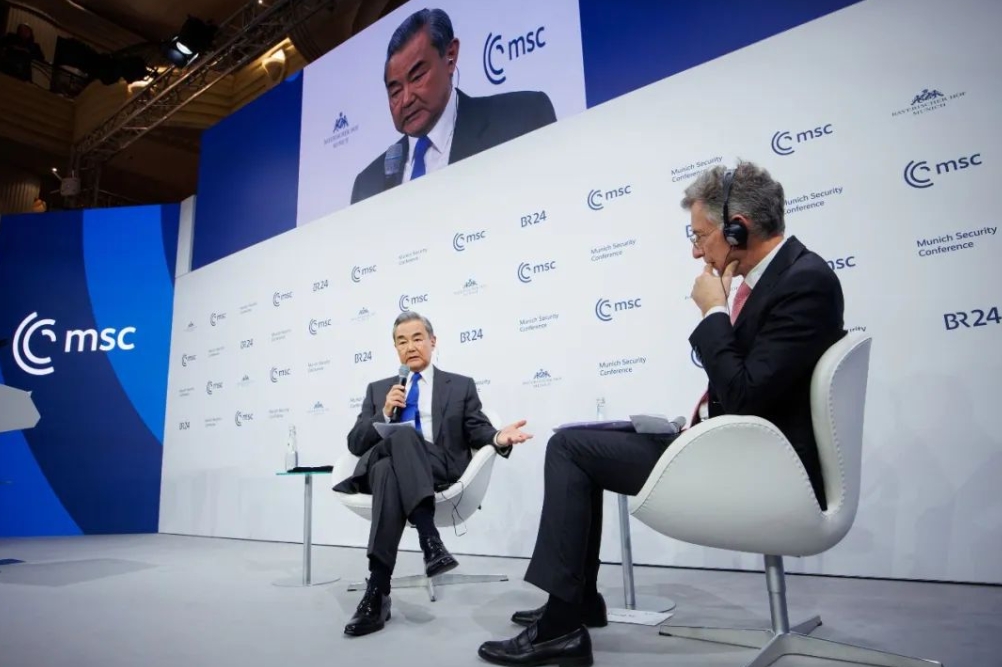
我们所处的是一个更加变乱交织的世界,大家都关心这个世界今后向何处去。借用今年慕安会报告的主题来回答,那就是走向多极化。80年前联合国成立时只有51个会员国,到今天是193个国家共乘一艘大船,多极化的世界既是历史的必然,也正在成为现实。
外交部 2025-02-19 11:13:56
 收藏资讯
收藏资讯
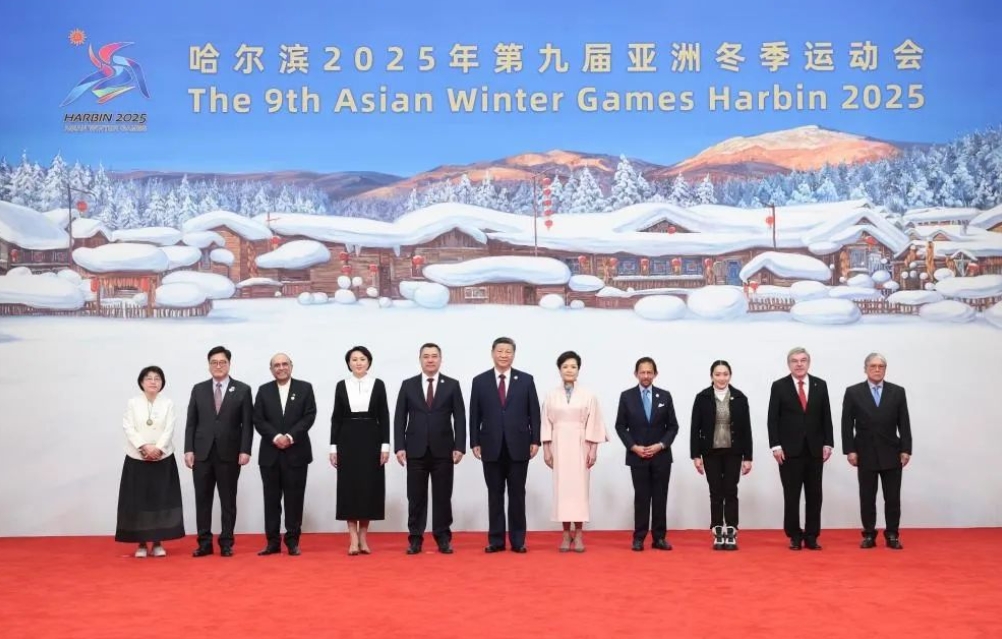
As the Chinese people celebrate the Spring Festival, I wish to extend, on behalf of the Chinese government and people, and also in the name of my wife and myself, a warm welcome and festive greetings to all the distinguished guests!
新华网 2025-02-12 10:47:34
 收藏资讯
收藏资讯
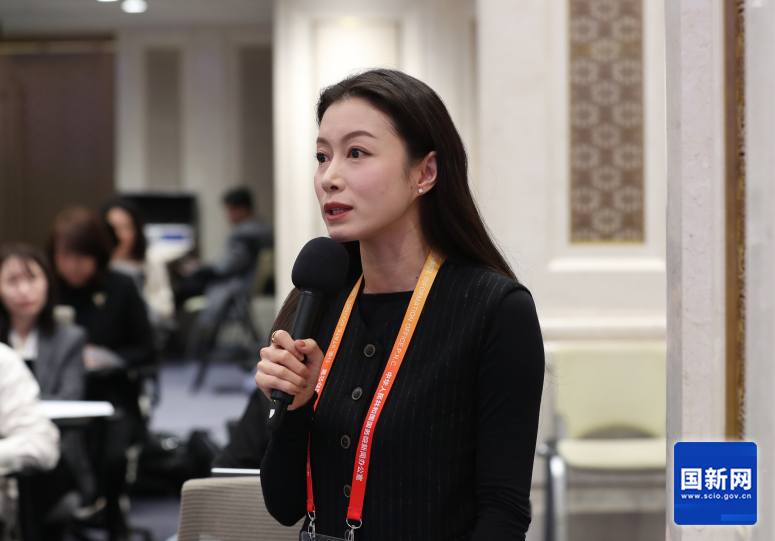
2025年第九届亚洲冬季运动会将在黑龙江省哈尔滨市举办。在亚冬会倒计时100天前夕,我们非常高兴邀请到亚冬会组委会副主席、中国奥委会副主席周进强先生,亚冬会组委会副主席、黑龙江省人民政府副省长韩圣健先生,亚冬会组委会副主席兼秘书长、哈尔滨市人民政府市长王合生先生,亚冬会组委会副秘书长、哈尔滨市人民政府副市长张海华女士,请他们为大家介绍哈尔滨亚冬会筹办情况。
国新办&CGTN 2025-01-06 14:49:40
 收藏资讯
收藏资讯
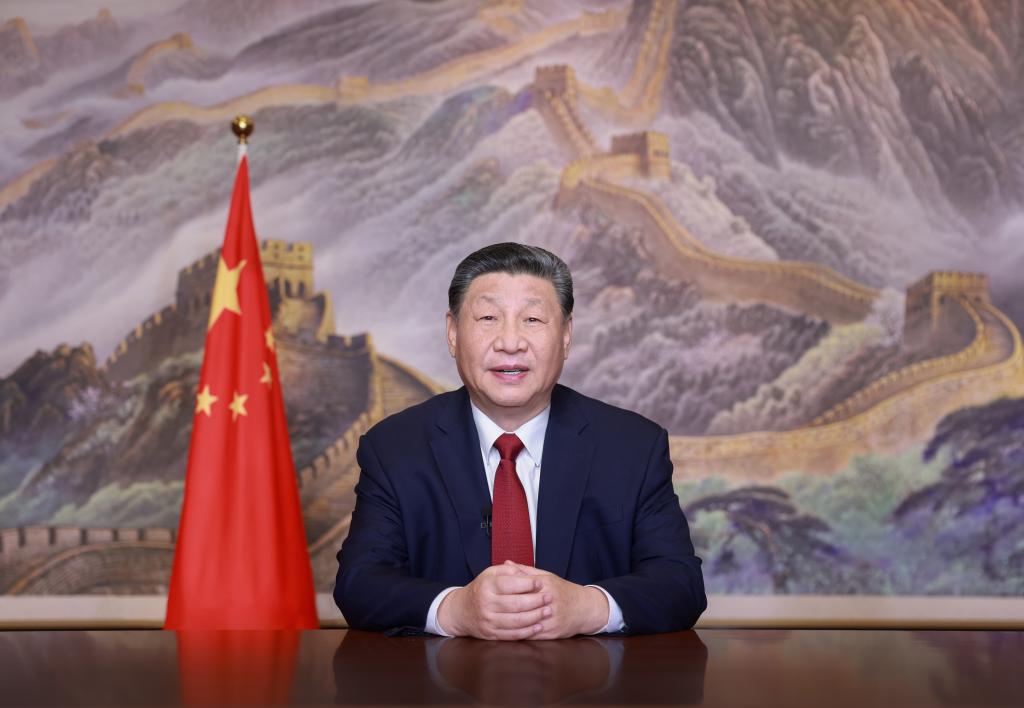
Greetings to everybody! Time flies fast, and the new year will be with us shortly. I extend my best wishes to you all from Beijing.
CGTN 2024-12-31 21:46:41
 收藏资讯
收藏资讯